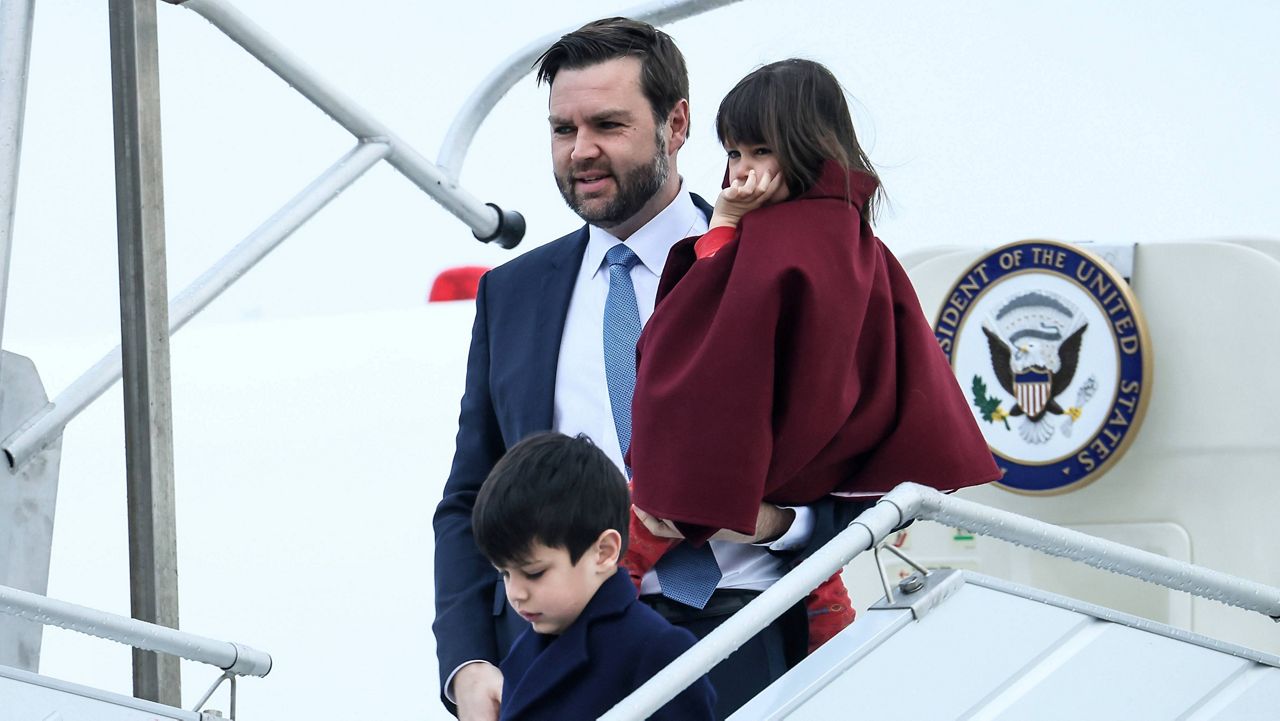PARIS — JD Vance stepped onto the world stage this week for the first time as U.S. vice president, using a high-stakes AI summit in Paris and a security conference in Munich to amplify Donald Trump's aggressive new approach to diplomacy.
What You Need To Know
- JD Vance is stepping onto the world stage for the first time as U.S. vice president this week, using a high-profile artificial intelligence summit in France and a gathering of national security leaders in Germany to showcase Donald Trump's more assertive approach to diplomacy
- Challenging diplomatic talks are expected while tech titans fight for dominance in the fast-moving technology industry
- Among those taking part in the two-day summit are heads of state, top government officials, CEOs and scientists from around 100 countries
- The summit will give many European leaders a chance to meet Vance for the first time
The 40-year-old vice president, who was just 18 months into his tenure as a senator before joining Trump's ticket, is expected, while in Paris, to push back on European efforts to tighten AI oversight while advocating for a more open, innovation-driven approach.
The AI summit has drawn world leaders, top tech executives, and policymakers to discuss artificial intelligence's impact on global security, economics, and governance. High-profile attendees include Chinese Vice Premier Zhang Guoqing, signaling Beijing's deep interest in shaping global AI standards.
French President Emmanuel Macron said Monday the Paris AI summit is "a wakeup call" for a European strategy to get competitive in a tech world now dominated by the U.S. and China.
Macron also called on "simplifying" rules in France and the European Union to allow AI advances, citing sectors like healthcare, mobility, energy, and "resynchronize with the rest of the world."
"We are most of the time too slow," he said.
The summit underscores a three-way race for AI supremacy: Europe striving to regulate and invest, China expanding access through state-backed tech giants, and the U.S. under Trump prioritizing a hands-off approach.
Vance's debut abroad
Vance has signaled he will use the Paris summit as a venue for candid discussions with world leaders on AI and geopolitics.
"I think there's a lot that some of the leaders who are present at the AI summit could do to, frankly — bring the Russia-Ukraine conflict to a close, help us diplomatically there — and so we're going to be focused on those meetings in France," Vance told Breitbart News.
Vance is expected to meet separately Tuesday with Indian Prime Minister Narendra Modi and European Commission President Ursula von der Leyen, according to a person familiar with planning who spoke on the condition of anonymity.
On Tuesday, Vance will have a working lunch with Macron to discuss Ukraine and the Middle East. Vance, like Trump, has questioned U.S. spending on Ukraine and the broader approach to isolating Russian President Vladimir Putin. Trump promised to end the fighting within six months of taking office.
Vance's diplomatic tour continues in Germany, where he will attend the Munich Security Conference and press European allies to increase their commitments to NATO and Ukraine and may meet with Ukrainian President Volodymyr Zelenskyy.
Vance also addressed what he called an "evil trend" in Europe toward censorship.
"We want people to be able to speak their minds, and we believe that free and open debate is actually a good thing. Unfortunately, a lot of our European friends have gone the wrong direction there," he said.
Fostering AI advances
The summit, which gathers major players such as Google, Microsoft and OpenAI, "is the first time we'll have had such a broad international discussion in one place on the future of AI," said Linda Griffin, vice president of public policy at Mozilla. "I see it as a norm-setting moment."
A global public-private partnership named "Current AI" will be launched to support large-scale initiatives that serve the general interest.
Nick Reiners, senior geotechnology analyst at Eurasia Group, noted an opportunity to shape AI governance by "moving away from this concentration of power amongst a handful of private actors and building this public interest AI instead."
However, it remains unclear if the United States will support such initiatives.
Macron's AI pitch
French organizers are also looking for the summit to ignite major investment in Europe, positioning the region as a contender in an industry increasingly shaped by U.S.-China rivalry.
Macron touted newly announced investments in France worth 109 billion euros ($113 billion) over the next five years.
The amount includes 50 billion euros ($52 billion) from the United Arab Emirates for a one-gigawatt data center and other tech facilities, 20 billion euros from Canada's Brookfield to deploy AI projects and 10 billion euros from UK's Fluidstack to build a giant one-gigawatt calculator.
"If you compare with some big recent announcement made in the U.S., it's at the right scale," Macron said in reference to Trump's support of the OpenAI-led Stargate AI data centers project.
Macron said one key asset for France is its "low carbon pilotable available energy" as the country gets about 75% of its electricity from nuclear energy, the highest level in the world. Mentioning Trump's slogan "drill baby drill," Macron said. "Here there's no need to drill, it's just plug baby plug."




